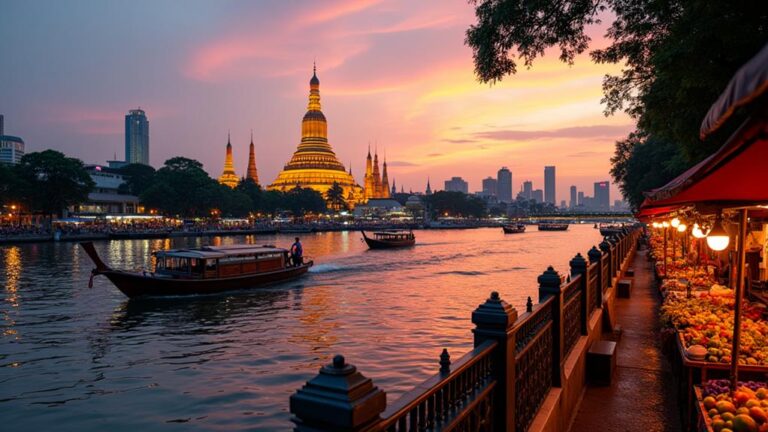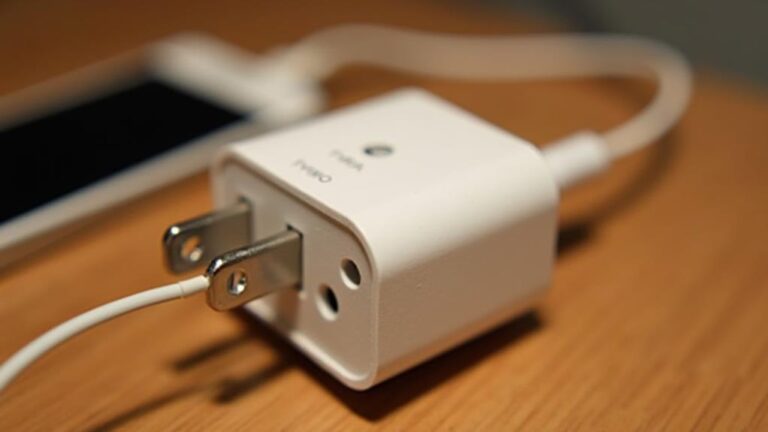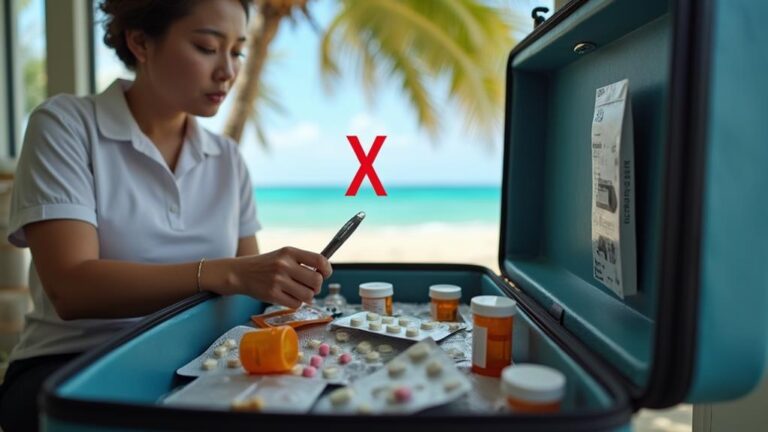To stay healthy in Thailand, follow these essential tips: Get vaccinated before your trip and pack a well-stocked medical kit. Stay hydrated in the hot climate and practice safe eating habits, avoiding raw foods. Protect yourself against mosquito-borne diseases with repellents and proper clothing. Be cautious with wildlife encounters and maintain good personal hygiene. Exercise sun safety precautions and secure thorough travel insurance. Remember to research quality healthcare facilities and learn some basic medical phrases in Thai. By following these guidelines, you'll be better prepared to enjoy your Thai adventure safely and comfortably. Discover more ways to safeguard your health while exploring this vibrant country.
Table of Contents
Key Takeaways
- Stay hydrated and protect yourself from the sun in Thailand's hot climate.
- Practice safe eating habits by avoiding raw foods and choosing reputable vendors.
- Use insect repellent and protective clothing to prevent mosquito-borne diseases.
- Maintain personal hygiene by washing hands frequently and using hand sanitizers when necessary.
- Obtain travel insurance and research quality healthcare facilities for medical emergencies.
Get Vaccinated Before You Go
Several important vaccinations should be on your pre-travel checklist when planning a trip to Thailand. Schedule a visit to a travel health clinic well in advance of your departure to make sure you're properly vaccinated against common health risks in Southeast Asia. Your healthcare provider will recommend shots for hepatitis A, typhoid, and Japanese encephalitis as standard safety measures for Thailand.
Depending on your specific itinerary and medical history, you might also need vaccinations for rabies, yellow fever, or malaria. It's essential to research the necessary immunizations for all Southeast Asia destinations you plan to visit, as requirements can vary by country and region.
While getting vaccinated is a key step in protecting your health, don't forget to pack a thorough medical safety kit. Include anti-diarrheal meds, antihistamines, pain relievers, and any prescription medications you regularly take.
To guard against mosquito-borne diseases like malaria, Zika, and dengue, pack EPA-registered insect repellent and treat your clothes with permethrin spray. These precautions, combined with your vaccinations, will help ensure a safer and healthier trip to Thailand.
Pack a Well-Stocked Medical Kit
Packing a well-stocked medical kit is crucial for any trip to Thailand. You'll want to include bandages, antiseptic, and any prescription medications you regularly take. Don't forget to pack extra supplies in case of emergencies or unexpected delays during your stay.
When preparing your medical kit, anticipate common health issues you might encounter in Thailand, such as stomach problems and insect bites. Have the necessary medications on hand to address these concerns quickly. To make sure you're ready for your specific needs, consult with a healthcare professional before your trip. They can help you customize your medical kit based on your health conditions and the destinations you'll be visiting in Thailand.
| Essential Items | Recommended Additions |
|---|---|
| Bandages | Insect repellent |
| Antiseptic | Oral rehydration salts |
| Prescriptions | Anti-diarrhea medicine |
Remember to keep your medical kit easily accessible in your luggage or daypack. You'll want to be able to reach it quickly when needed. By packing a thorough medical kit, you'll be better prepared to handle minor health issues and enjoy your Thai adventure with peace of mind.
Stay Hydrated and Beat the Heat
Now that you've prepared your medical kit, it's time to focus on another fundamental aspect of staying healthy in Thailand: proper hydration. Thailand's hot and humid climate demands constant attention to your fluid intake to prevent heat-related illnesses. As you explore this tropical paradise, you'll need to stay vigilant about your hydration levels.
Dehydration can quickly sneak up on you, showing up as headaches, dizziness, and fatigue. To combat these symptoms, always carry a reusable water bottle and opt for bottled water when refilling.
Don't wait until you're thirsty to drink; make it a habit to sip water regularly throughout the day.
Consider incorporating electrolyte drinks into your hydration routine. These beverages can help replenish essential minerals lost through sweating, which is unavoidable in Thailand's tropical climate.
Practice Safe Food Habits
Savoring Thailand's diverse culinary delights is a highlight of any trip, but it's crucial to practice safe food habits to avoid illness. To minimize the risk of food poisoning, steer clear of raw or undercooked foods. Instead, opt for hot, freshly prepared dishes from reputable establishments. This approach helps guarantee that harmful bacteria have been eliminated during cooking.
Before indulging in any meal, wash your hands thoroughly to reduce the chances of contamination.
When it comes to hydration, stick to bottled water and avoid drinking beverages containing ice made from tap water, as this can lead to gastrointestinal issues.
While street food is an integral part of Thai culture, exercise caution when selecting vendors. Choose stalls with high turnover to secure freshness and quality. This strategy increases the likelihood that you're consuming food that hasn't been sitting out for extended periods.
Protect Against Mosquito-Borne Diseases

To protect yourself against mosquito-borne diseases in Thailand, you'll need to take several precautions.
Use EPA-registered insect repellents containing DEET or picaridin, and wear long-sleeved shirts, pants, and socks to minimize skin exposure.
When sleeping, especially in rural areas, consider using a mosquito net treated with insecticide for added protection.
Use Epa-Registered Insect Repellent
Protecting yourself against mosquito-borne diseases is necessary when visiting Thailand. To ward off these pesky insects and the illnesses they carry, use EPA-registered insect repellent containing DEET, picaridin, or oil of lemon eucalyptus. These effective ingredients will help shield you from mosquitoes that can transmit dengue fever, Zika virus, and chikungunya.
Apply the repellent to all exposed skin and clothing, paying extra attention during dawn and dusk when mosquitoes are most active. Don't forget to reapply regularly, especially after swimming or sweating, to maintain best protection throughout your trip.
| Repellent Type | Active Ingredient | Protection Duration |
|---|---|---|
| Spray | DEET | Up to 8 hours |
| Lotion | Picaridin | Up to 14 hours |
| Natural | Lemon Eucalyptus | Up to 6 hours |
Choosing the right insect repellent is vital for your health and enjoyment in Thailand. By using EPA-registered products and following proper application techniques, you'll greatly reduce your risk of mosquito bites and the diseases they can transmit. Don't let mosquitoes ruin your Thai adventure – stay protected and make the most of your trip.
Wear Protective Clothing
An necessary step in safeguarding yourself against mosquito-borne diseases in Thailand is wearing protective clothing. Opt for light-colored, long-sleeved shirts and pants to minimize exposed skin and deter mosquitoes. Choose loose-fitting, breathable fabrics to stay comfortable in Thailand's tropical climate while maintaining protection.
To maximize your defense against mosquito bites, consider these additional measures:
- Apply insect repellent to both exposed skin and clothing
- Treat your clothes with permethrin for added protection
- Wear closed-toe shoes and socks to shield your feet and ankles
- Use protective clothing in combination with other preventive methods
When selecting your wardrobe for Thailand, prioritize function over fashion. Long sleeves and pants are critical for reducing the risk of mosquito bites, which can transmit diseases like dengue fever and Zika virus. Remember to apply insect repellent to your clothing as well as your skin for thorough protection.
Sleep Under Treated Nets
Sleep under treated mosquito nets to create an important barrier against disease-carrying insects while resting in Thailand. These specialized nets are highly effective in repelling mosquitoes and providing a physical shield against bites during the night. By using treated nets, you'll notably reduce your risk of contracting mosquito-borne diseases like dengue fever and malaria, which are prevalent in tropical regions.
Insecticide-treated nets are designed to kill or repel mosquitoes on contact, offering an additional layer of protection as you sleep. This cost-effective and practical solution is essential for safeguarding your health during your stay in Thailand. The nets' effectiveness in preventing mosquito bites makes them an indispensable tool for travelers and residents alike.
When choosing accommodation in Thailand, prioritize places that provide treated mosquito nets. If they're not available, consider purchasing your own before your trip. Remember to properly set up the net each night, ensuring it covers your sleeping area completely. By incorporating this simple yet powerful preventive measure into your nightly routine, you'll notably enhance your protection against mosquito-borne illnesses and enjoy a healthier, worry-free stay in Thailand.
Know Where to Seek Medical Care
When it comes to seeking medical care in Thailand, knowing your options is vital. Bangkok stands out with its outstanding medical facilities, making it a dependable choice for healthcare needs. However, you'll find high-quality dispensaries and hospitals in urban centers across the country.
To make sure you're prepared for any medical situation, follow these key steps:
- Research and identify quality healthcare facilities in advance
- Learn key medical phrases in the local language
- Obtain thorough travel insurance covering medical emergencies
- Familiarize yourself with the locations of nearby medical centers
Remember, travel insurance is mandatory in Thailand, guaranteeing you have access to necessary medical care. This requirement protects you financially and ensures you'll receive appropriate treatment if needed.
While Thailand offers excellent healthcare options, it's important to be proactive in your approach. By identifying reputable facilities beforehand and understanding basic medical terminology in Thai, you'll be better equipped to handle any health issues that may arise during your stay.
Don't let potential medical concerns hinder your travel experience – with proper preparation, you can confidently explore Thailand while knowing you have access to quality healthcare when needed.
Be Cautious With Wildlife Encounters

Thailand's diverse wildlife can be enchanting, but it's vital to exercise caution during encounters. Rabies is a significant concern in the country, so avoid contact with stray animals, especially dogs and cats. If you're bitten, seek immediate medical attention to prevent potential infection.
When exploring nature, be aware of local wildlife that can pose risks. Bites or stings from various creatures may lead to infections or complications. If you encounter a venomous snake or dangerous insect, seek medical care promptly. It's essential to clean and treat any wounds quickly to prevent infections, regardless of the source.
To minimize risks during wildlife encounters, follow safety guidelines and stay informed about potential dangers in the areas you're visiting. Don't attempt to feed or touch wild animals, and maintain a safe distance when observing them. If you're planning outdoor activities, consider wearing appropriate protective clothing and using insect repellent.
Maintain Personal Hygiene
Maintaining adequate personal hygiene is essential for staying healthy in Thailand.
You'll want to wash your hands frequently with soap and water, especially before eating or handling food.
Additionally, make sure you practice safe food handling techniques, such as thoroughly cooking meals and avoiding raw or undercooked meats, to prevent foodborne illnesses.
Handwashing Prevents Illness
Proper handwashing is your first line of defense against illness in Thailand. This simple yet effective practice can significantly reduce your risk of contracting diarrhea-related illnesses, which are common health issues in the country.
With Thailand's popularity for street food, maintaining good hand hygiene becomes even more crucial to avoid foodborne illnesses.
To ensure you're washing your hands effectively, follow these key steps:
- Use soap and clean running water
- Scrub for at least 20 seconds, as recommended by the CDC
- Pay attention to all surfaces, including between fingers and under nails
- Dry your hands thoroughly with a clean towel or air dryer
Remember to wash your hands before eating, especially when indulging in street food, and after using the restroom. These moments are critical for preventing the spread of infections.
Safe Food Handling Practices
Implementing safe food handling practices is essential for maintaining your health while in Thailand. To prevent foodborne illnesses, always wash your hands thoroughly with soap and water before eating or handling food. When soap isn't available, use hand sanitizers or wipes to maintain proper hygiene.
Be cautious about your food choices, especially when dining out. Avoid consuming raw or undercooked meat, seafood, and eggs, as these can harbor harmful bacteria. When purchasing food from street vendors, make sure they follow proper hygiene practices and that the food is cooked thoroughly.
If you're preparing your own meals, keep perishable items refrigerated or properly stored to prevent contamination and spoilage. This is particularly crucial in Thailand's hot and humid climate, where food can spoil quickly.
Remember that safe food handling practices extend beyond just cooking and eating. When shopping for groceries or visiting markets, be mindful of food storage conditions and choose vendors who maintain clean environments. By following these guidelines, you'll greatly reduce your risk of falling ill during your stay in Thailand.
Exercise Sun Safety Precautions

Beneath Thailand's tropical sun, protecting yourself from harmful UV rays is essential for a safe and enjoyable trip. To exercise proper sun safety, apply a broad-spectrum sunscreen with a high SPF regularly throughout the day. Don't forget to reapply after swimming or sweating.
Wear lightweight, loose-fitting clothing that covers your skin, and don a wide-brimmed hat to shield your face and neck from direct sunlight.
To minimize your risk of heat exhaustion and sunburn, follow these key precautions:
- Seek shade during peak sun hours (10 am to 4 pm)
- Stay hydrated by drinking plenty of water
- Wear sunglasses to protect your eyes
- Use an umbrella for additional shade when walking outdoors
Secure Comprehensive Travel Insurance
When venturing to Thailand, obtaining thorough travel insurance isn't just a precaution—it's a necessity. All-encompassing travel medical insurance provides essential coverage for unexpected situations, guaranteeing your peace of mind during your trip. It's vital to choose a policy that includes emergency evacuation and medical expenses coverage, as healthcare costs for foreign visitors in Thailand can be substantial.
| Coverage Type | Importance | Benefits |
|---|---|---|
| Medical Expenses | High | Covers unforeseen illnesses and injuries |
| Emergency Evacuation | Critical | Ensures safe transport to suitable facilities |
| Trip Cancellation | Valuable | Safeguards your investment in case of unforeseen events |











